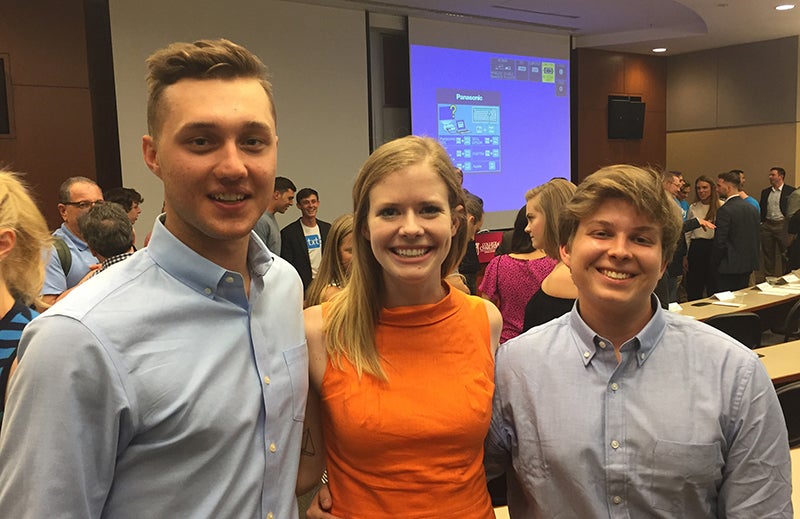What do connecting parents with after-school programs and sourcing wisdom across an array of cultures have to do with each other?
They’re both apps developed by student teams in the College’s Interdisciplinary Center for Applied Technology program, also known as ICAT, and they were both big winners in a pitch contest during the program’s Demo Day on Thursday, April 27, 2017.

WisdomMothers, an app that monetizes the sharing of wisdom worldwide, was developed by (clockwise from lower left) Veronique Hut, Connor Welsh, Riley Claremont and Abby Grand.
Billy Koutcher (philosophy major), Courteny Cox (data science) and David Furst (supply chain management), who collectively make up team Cnect(ed), took home top honors at the event with their app, which aggregates after-school programs in a specific community, enabling users to review program options, enroll and pay for a selected program all on the same platform.
The Cnect(ed) team will share $10,000 in prize money with the second- and third-place teams, whose respective apps offer a texting system for product and service reviews (Txtra) and a means of teaching emotional intelligence to autistic children (LearningBeez).
While all seven student teams and their apps were judged in the competition, they were also considered for a different honor – a trip to New York City to present their app to the United Nations Development Fund.
Seniors Veronique Hut (data science), Riley Clermont (business administration), Connor Welsh (computer information systems) and sophomore Abby Grand (international relations) won that prize. Their app, WisdomMothers, monetizes the sharing of wisdom across cultures by providing users access to sage advice from elders around the globe.
Each of the seven student teams spent the spring semester developing products that make a profit while also making a difference. That’s effectively the new unofficial tagline for the ICAT program, now in its third year.
“ICAT represents a new type of innovative, experiential learning program at the College in which students of all majors can come together in the School of Business to solve problems for profit and with a purpose,” explained professor Chris Starr, who co-founded and co-directs the program with professor David Wyman.
ICAT, housed in the School of Business’s Center for Entrepreneurship, is a unique incubator program that brings together students studying business, technology and the liberal arts in a one-semester course on management and entrepreneurship. And at the end of each semester, serious funding is at stake for each of the teams that make up the ICAT cohort.
The semester culminates with a pitch event. This semester, the student teams presented their apps and businesses to a panel of judges made up of entrepreneurs, nonprofit executives and business leaders from the community. This all happened in front of a standing-room-only crowd at the College’s Wells Fargo Auditorium.
Wyman and Starr say they were impressed by what all seven teams accomplished. The rest of the apps competing for prizes ranged broadly from Rently – a community platform that enables neighbors to rent equipment, tools or other devices from each other – to ELAP, an app that connects college students to internship, research and study abroad opportunities.

Hassam Solano-Morel (l) and Michael Gude developed ELAP, an app that enables college students and businesses or organizations to connect for internships, research and study abroad opportunities.
During Demo Day, each team was required to make a brief, three-minute pitch, followed by four minutes of questioning by the judges. The teams were asked about revenue models, business development needs and other concerns. In the case of Guestaurant, an app that would unite would-be diners and cooks intent on serving meals to strangers in their homes, the judges asked students about liability concerns.
While the judges deliberated, the College’s Impact Entrepreneur in Residence, Stuart Williams, explained ICAT’s new focus on social and environmental entrepreneurship.
“The greatest wealth accumulation in the U.S. over the next 50 years will be generated by people who develop solutions for humanitarian and environmental issues,” says Williams. “This is why I lobbied to change the focus of ICAT from a purely entrepreneurial endeavor to one of socially responsible entrepreneurship. These students you’ve heard from today are now driving this. They know that this initiative needs to be just as much about making a difference as it is about making a profit.”
Starr added that the students’ involvement won’t end with the pitch event; six of the seven teams will be moving forward to establish and grow companies.
Featured image shows David Fourst, left, Courtney Cox and Billy Koutcher of Cnect(ed).





